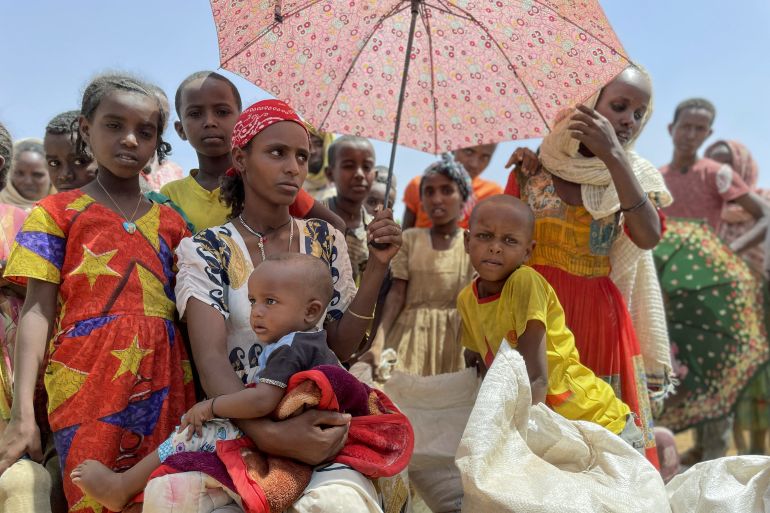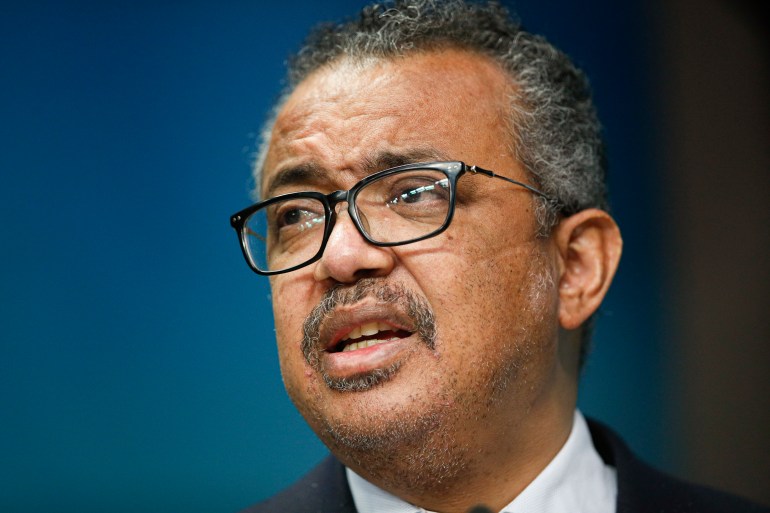Lack of help for Tigray crisis due to skin colour, says WHO chief
WHO chief says the situation in the northern Ethiopia region is the ‘worst humanitarian crisis in the world’ and asks why it is not receiving the same attention as the Ukraine conflict.

The head of the World Health Organization (WHO) has described the “man-made catastrophe” in Ethiopia’s Tigray region as the “worst disaster on Earth” and questioned whether global leaders have not responded due to “the colour of the skin of the people in Tigray”.
WHO Director-General Tedros Adhanom Ghebreyesus said “unimaginable cruelty” was being inflicted on six million people in the northern region, effectively cut off from basic services for nearly two years.
Keep reading
list of 3 itemsEthiopia’s Abiy says body formed to negotiate with Tigray rebels
Tigray Crisis: Ethiopia’s Civil War
Calling it the “worst humanitarian crisis in the world”, Tedros questioned in an emotional appeal why the situation is not getting the same attention as the Ukraine conflict. Tedros, who is himself from Tigray, suggested racism may be why the situation ranked behind Ukraine in terms of international attention.
“Maybe the reason is the colour of the skin of the people,” Tedros told a virtual media briefing. In April this year at a briefing, he questioned whether “black and white lives” in emergencies worldwide are given equal attention.

In November 2020, Ethiopian Prime Minister Abiy Ahmed ordered troops into the region to topple the Tigray People’s Liberation Front, accusing rebels of attacking federal army camps.
Since the war broke out, Ethiopia’s northernmost region has suffered food shortages and access to basic services such as electricity, communications and banking has been severely limited.
“As a result, the people of Tigray are facing multiple outbreaks of malaria, anthrax, cholera, diarrhoea and more,” Tedros told a WHO press conference in Geneva. “This unimaginable cruelty must end. The only solution is peace.”
Fighting has eased in northern Ethiopia since a humanitarian truce was declared at the end of March, allowing the resumption of desperately needed international aid convoys to Tigray.
In recent weeks both sides have mooted the possibility of peace talks.
But Tedros said only a trickle of food and medicines had made it into the region, and said basic services must be resumed in order to build confidence in the peace negotiations.
“This is the worst disaster on Earth as we speak … That’s the bare truth.”
He said the drought affecting the Horn of Africa was compounding the crisis.
“I appeal to the Ethiopian government to resolve this peacefully. The ball is in its hand,” the country’s former health and foreign minister said.
WHO Emergencies Programme Director Michael Ryan also hit out at an apparent shortage of concern about the drought and famine unfolding in the Horn of Africa, and the ensuing health crisis.
“No one seems to give a damn about what’s happening in the Horn of Africa,” said Ryan, speaking at a virtual media briefing on Wednesday.
Ibrahima Soce Fall, the WHO’s assistant director-general for emergency response, said that recovery in the health system in Tigray would take “months and months”, with the current needs far from being fulfilled before it was even possible to talk about recovery.